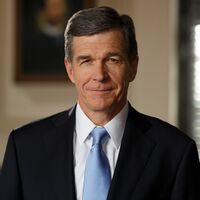Grand Chancellor of Tevitheim
| Grand Chancellor of Tevitheim | |
|---|---|
| Tevitheims Storkanslar | |
 Standard of the Grand Chancellor | |
| Style | Herr Storkanslar (male) Fru Storkanslar (female) |
| Type | Head of Government |
| Member of | Cabinet |
| Appointer | Electoral Council or by succession |
| Term length | 6 years, non-renewable |
| Constituting instrument | Constitution of Tevitheim |
| Formation | 11 July 1959 |
| First holder | Jens Vealund |
| Succession | Vice Chancellor |
| Salary | ᵹ5,000,000 |
The Grand Chancellor of Tevitheim (Tronder: Tevitheims Storkanslar) is the head of government of Tevitheim. Under the 1959 Constitution, the grand chancellor heads the executive branch of the federal government and is the commander in chief of the Tevitheimer Armed Forces. The current grand chancellor is Daniel Bylund, who won election in the 2019 election. His term will exppire on 11 November, 2025.
The grand chancellor is elected de jure indirectly through the Electoral Council to a single six-year term, along with the vice chancellor. However, the Popular Vote Agreement (PSA) means that grand chancellors are de facto elected by popular vote. Under the terms of the Tevitheimer constitution, ratified in 1959, no person who has been elected to a chancellery term may be elected to a second. In addition, vice chancellors have become grand chancellors by virtue of a grand chancellors's intra-term death or resignation and who serve more than 3 years as grand chancellor are prohibited from running for a term in their own right. In all, X individuals have served a total of terms, when Erik Mannerheim served an elongated term due to the Third Great War.
The power includes the execution and enforcement of federal law and the responsibility to appoint federal executive, diplomatic, regulatory, and judicial officers. Based on constitutional provisions empowering the grand chancellor to appoint and receive ambassadors and conclude treaties with foreign powers, and on subsequent laws enacted by the Alnating, the grand chancellor has primary responsibility for conducting U.S. foreign policy. The grand chancellor also plays a leading role in the federal legislative and domestic policymaking process. As part of the system of separation of powers, the grand chancellor wields a veto power over federal legislation. In addition, as the leaders of their political parties, policymaking is shaped by the outcome of chancellery elections. The grand chancellor may also affect policymaking through executive orders, agency regulations, and appointments to the civil service.
As the leader of the world's fourth largest economy and one of the most powerful militaries on the planet, the grand chancellor possesses significant domestic and international hard and soft power. For much of the latter half of the 20th century, the Tevitheimer grand chancellor was often called one of the "leaders of the free world".
History
The position of grand chancellor did not exist prior to 1959. The title of chancellor has a long history in Tevitheim as a government official aiding in the administration of the state's affairs. Chancellors often held positions comparable to secretaries and ministers in other countries, with chancellor being made the official title of Tevitheim's cabinet officials after independence.
In 1959, with Tevitheim's new constitution, a position for head of government was needed. Intended originally to control the civil service and be a senior leader of the Cabinet, titles such as "first chancellor", "chief chancellor", or "chancellor-president" were suggested alongside the title of grand chancellor. Eventually, the title of grand chancellor was selected for the head of government. The position became official with the election of Jens Vealund on 29 September, 1959.
